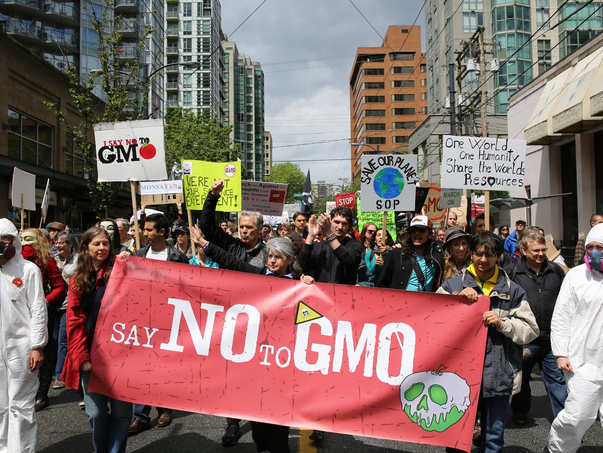[captionpix imgsrc=”https://pvnn.org/wp-content/uploads/2015/07/briangmo.png” captiontext=”Photo courtesy of Wikipedia Commons”]
Humanity has been genetically modifying foods since the beginning days of cultivation, claims American astrophysicist, cosmologist, and science communicator Neil deGrasse Tyson. The process is artificial selection; a method of crossbreeding to produce favorable traits in animals and plants, has been used for centuries. A refresher in high school biology will have you remember Gregor Mendel, the 1800s scientist responsible for founding modern genetic science. He is better well known as the guy who conducted pea plant experiments and established the rules of heredity, the passing down of one’s traits to their offspring through reproduction. By understanding this process, artificial selection can be better applied and more precise.
After one hundred and fifty years later, humans have artificially selected for the more favorable traits in nearly every plant and animal that is grown, raised, and eaten. A century after Mendel, there was another breakthrough in the human food supply: genetic engineering, or GE. It is more commonly understood by what it produces: Genetically Modified Organisms (GMOs). It is only a more precises process than Mendel’s original method, involving the alteration of an organism’s genome at the molecular level to be resilient against virus or disease, be resistant to weed-killing herbicides, or to produce their own insecticide. This has spurred public concern and skepticism for the practice and has recently reached a fever pitch. A study by the Pew Research Center revealed an enormous gap in the differentiating opinions on the safety of GMOs between the public and scientists. While 88% of scientists in the American Association for the Advancement of Science (AAAS) believe GMOs to be perfectly safe to eat, only 37% of U.S. adults hold the same view.[ref]“Public and Scientists’ Views on Science and Society,” January 29, 2015, http://www.pewinternet.org/2015/01/29/public-and-scientists-views-on-science-and-society[/ref] The Vendetta, therefore, is how exactly to assuage public fears and skepticism of GMOs, while continuing to advance food production for the population.
The anti-GMO movement consists primarily of corporations, groups, and individuals who align with an environmentally conscious disposition. [ref]“GMOs And The Dilemma Of Bias,” January 7, 2014, http://www.npr.org/sections/13.7/2014/01/07/260184901/gmos-and-the-dilemma-of-bias[/ref] There is a bounty of contention regarding the use of GMOs beyond its consumption, including seed patents, the financial effect on poor farmers, and environmental consequences. However, the Pew research indicates concern of health risks trumps all. This public opinion has fueled political ballot initiatives in parts of the United States that aim to label GMO foods, and has opened up marketing opportunities for companies, such as Chipotle[ref]“Food with Integrity: G-M-Over It,” 2015, http://chipotle.com/gmo[/ref] and Ben and Jerry’s Ice Cream,[ref]“Labelize It!” http://www.benjerry.com/GMO[/ref] to remove GMO ingredients to appeal to consumers. Doubts about GMO’s safety on health ranges from uncertainty about manipulating the genetic structure of the food we eat[ref]“The Danger Of GMOs: Is It All In Your Mind?” April 27, 2015, http://www.npr.org/sections/13.7/2015/04/27/402482753/the-danger-of-gmos-is-it-all-in-your-mind[/ref] and the fear of overusing weed-killing sprays on herbicide-resistant crops.[ref]“Tortilla Reform,” May 5, 2015, https://medium.com/natural-resources-defense-council/tortilla-reform-53117f2d96db[/ref] Opponents have cited reports from the World Health Organization’s International Agency for Research on Cancer, which concluded that the use of glyphosate, the most heavily used herbicide, is a probable cause of cancer.[ref]“Roundup and Risk Assessment,” April 10, 2015, http://www.newyorker.com/news/daily-comment/roundup-and-risk-assessment[/ref] Despite herbicide being an indirect component to the practice of growing GE foods, the results of the test are an anomaly in the sea of “hundreds of toxicological studies and nearly a thousand published reports,” that found neither “carcinogenic or mutagenic properties of glyphosate nor that glyphosate is toxic to fertility, reproduction or embryonic/fetal development in laboratory animals.”[ref]“The BfR has finalised its draft report for the re-evaluation of glyphosate,” February 4, 2015, http://www.bfr.bund.de/en/the_bfr_has_finalised_its_draft_report_for_the_re_evaluation_of_glyphosate-188632.html[/ref] However, those opposed to GMO foods are not deterred by scientific results and continue to question the safety of GMOs due to a fear for what the future might hold.
Slate’s William Saletan points to a lack of substantial evidence that there is an inherent health risk in ingesting food developed through genetic engineering.[ref] “Unhealthy Fixation,” July 15, 2015, http://www.slate.com/articles/health_and_science/science/2015/07/are_gmos_safe_yes_the_case_against_them_is_full_of_fraud_lies_and_errors.html[/ref] While Saletan mention others issues within agricultural industry and farming methods, he argues that an anti-GMO campaign focused on the supposed health risks in eating GE food is misguided and creates a misinformed public. In his article, Saletan cites the numerous scientific studies that fail to conclude any inherent health risks in genetic engineer after nearly two decades of extensive research. While he does expresses that there are “valid concerns” about the use of herbicide, he concludes that these are not “fundamentally about genetic engineering.” Researcher Charles Benbrook, who has been on the debate show Intelligence Squared to argue against the use of GMOs,[ref]“Genetically Modified Food,” December 3, 2014, http://intelligencesquaredus.org/debates/upcoming-debates/item/1161-genetically-modify-food[/ref] has previously stated that glyphosate is the safest of herbicide on the market.[ref]“Impacts of genetically engineered crops on pesticide use in the U.S. — the first sixteen years,” September 28, 2014, http://www.enveurope.com/content/24/1/24[/ref]
There is, however, legitimate concern in regards to herbicide: herbicide tolerance. The use of only one type of herbicide has allow for a random mutation in weeds to become tolerant. But herbicide tolerance is not only a product of GMO farming. Many sunflowers (an alternative used by Chipotle in place of GMO soy) have developed a tolerance to a different herbicide, ALS inhibitors, through breeding. It turns out that more weeds have developed a tolerance for ALS inhibitors than glyphosate, creating more “superweeds” (as Chipotle refers to them) Policy and regulation should be written to address this reality. A blanket labeling of GMOs achieves only in obfuscating the truth about the practice and avoids the nuances of agriculture. But the first step is education. When a survey[ref]Ilya Somin, “Over 80 percent of Americans support “mandatory labels on foods containing DNA,” January 17, 2015, https://www.washingtonpost.com/news/volokh-conspiracy/wp/2015/01/17/over-80-percent-of-americans-support-mandatory-labels-on-foods-containing-dna[/ref] reveals that the same percentage of people who support GMO labeling also support the labeling of all foods that contain DNA, the molecule that carries the genetc information for all living things, we must consider that a fear of GMOs stems from a lack of understanding. While we should be encouraging smarter farming, from a rotation of herbicides and reduction in monoculture crops[ref]“Genetically Engineered Crops in the United States,” February, 2014,http://www.ers.usda.gov/publications/err-economic-research-report/err162/report-summary.aspx[/ref], we should also be investing in the scientific education of our children.
By promoting GMOs and encouraging better research, scientists can move more quickly to develop plants to require less herbicide. The first step to achieving this is by educating the public on GMOs and better practices for farming to make wiser choices at the market and at the ballot box. The science is in, GMOs are safe to eat. Now to get the public up to speed.
Take Action:
The American Association for the Advancement of Science is an organization dedicated an initiative called Project 2061. The program aims to improve mathematical, science, and technology literacy in America so that the people can make wiser choices for public policy.




